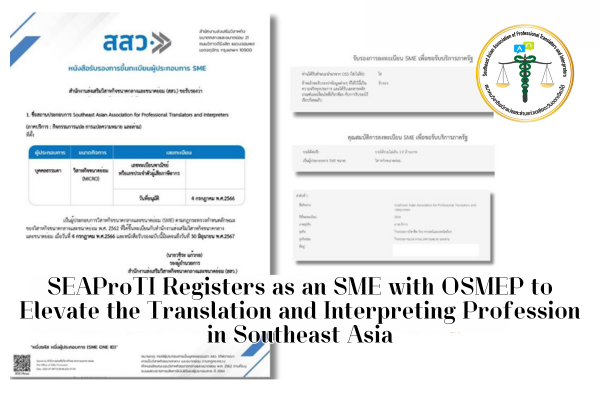Shareholder Meetings in Thai Law
21 January 2025, Bangkok – Shareholder meetings play a crucial role in Thai company law, as stated in Section 1144 of the Civil and Commercial Code, which reads: “Every limited company shall be managed by a director or directors under the control of the general meeting of shareholders and according to the regulations of the company.” Therefore, shareholders play an important, albeit indirect, role in the management of the company. However, a significant legal issue regarding shareholder meetings is who is allowed to call a meeting of the shareholders. According to the Civil and Commercial Code, a meeting of shareholders may be called by the following individuals:
- The authorized director of the company (Section 1172)
- Shareholders whose combined shares constitute no less than one out of five of the combined total of all shares (Section 1173)
Nevertheless, it is important to note that if the company’s own regulations set rules for a meeting of shareholders that are more stringent than those of the Civil and Commercial Code, the company’s regulations will take precedence, unless they are otherwise prohibited by law.
In Thai Supreme Court Decision No. 452/2518, the defendant company’s regulations declared that “Extraordinary meetings may be called at any time whenever the board of directors sees fit or when shareholders representing at least one out of five of all shares of the company make a request in writing calling for an extraordinary meeting.” The Court held that the company regulations authorized the board of directors to call for an extraordinary meeting, not any one director acting alone. Even if shareholders were to make a request in writing calling for an extraordinary meeting, it must be presented to the board of directors, who must then call the meeting.
The Court stated: “It appears that M., a company director, acting by himself, called for a meeting of the shareholders of the defendant company on February 22, 1970, without presenting a request from the shareholders to the board of directors according to the company regulations on the date of the meeting. S., the chairman of the board of directors, ordered that the meeting be canceled. M. agreed to the order but nevertheless violated it and held the meeting regardless. At the meeting, T. was appointed as chairman of the meeting although T. lacked the qualifications according to the company regulations. The aforementioned meeting was therefore in violation of the company regulations. The board of directors appointed according to the resolution passed at that meeting was unlawful and lacked authority to manage the company. That board of directors also lacked authority to call the shareholder meeting on October 11, 1970. All resolutions passed at that meeting on October 11, 1970 have no force.”
Thai corporate law is complex. Foreigners who are managing Thai companies are advised to consult with competent Thailand lawyers or associations such as SEAProTI to ensure compliance with relevant laws.
The Role of Certified Translators and Interpreters
Certified translators, legal document ratifiers, and professional interpreters affiliated with the Southeast Asian Association of Professional Translators and Interpreters (SEAProTI) play a vital role in assisting foreign managers and stakeholders to understand and navigate Thai corporate law accurately. They provide essential language support and help ensure smooth business operations in compliance with Thai regulations.
SEAProTI’s certified translators, translation certification providers, and certified interpreters:
The Southeast Asian Association of Professional Translators and Interpreters (SEAProTI) has officially announced the criteria and qualifications for individuals to register as “Certified Translators,” “Translation Certification Providers,” and “Certified Interpreters” under the association’s regulations. These guidelines are detailed in Sections 9 and 10 of the Royal Thai Government Gazette, issued by the Secretariat of the Cabinet under the Office of the Prime Minister of the Kingdom of Thailand, dated July 25, 2024, Volume 141, Part 66 Ng, Page 100.
To read the full publication, visit: the Royal Thai Government Gazette
การประชุมผู้ถือหุ้นในกฎหมายไทย
21 มกราคม 2568, กรุงเทพมหานคร – การประชุมผู้ถือหุ้นถือเป็นองค์ประกอบสำคัญของกฎหมายบริษัทในประเทศไทย ซึ่งมาตรา 1144 ของประมวลกฎหมายแพ่งและพาณิชย์ได้ระบุว่า “บริษัทจำกัดทุกแห่งจะต้องบริหารงานโดยกรรมการหรือนายทะเบียนที่ได้รับมอบหมายภายใต้การควบคุมของการประชุมผู้ถือหุ้นและข้อบังคับของบริษัท” ซึ่งแสดงให้เห็นว่าผู้ถือหุ้นมีบทบาทสำคัญในฐานะผู้ที่มีอำนาจในการควบคุมการดำเนินงานของบริษัท แม้ว่าจะเป็นในลักษณะทางอ้อมก็ตาม
อย่างไรก็ตาม เรื่องที่สำคัญในการประชุมผู้ถือหุ้นคือประเด็นเกี่ยวกับการเรียกประชุม ซึ่งตามประมวลกฎหมายแพ่งและพาณิชย์ได้กำหนดว่า ผู้ที่สามารถเรียกประชุมผู้ถือหุ้นได้มีดังนี้:
- กรรมการที่ได้รับมอบอำนาจของบริษัท (มาตรา 1172)
- ผู้ถือหุ้นที่มีหุ้นรวมกันไม่น้อยกว่า 1 ใน 5 ของหุ้นทั้งหมด (มาตรา 1173)
แต่ทั้งนี้ หากข้อบังคับของบริษัทกำหนดเงื่อนไขที่เข้มงวดกว่ากฎหมาย ข้อบังคับของบริษัทจะมีผลเหนือกว่า หากไม่ขัดต่อกฎหมาย:
ตัวอย่างจากคำพิพากษาศาลฎีกาที่ 452/2518 ระบุว่า ข้อบังคับของบริษัทได้กำหนดไว้ว่าการประชุมพิเศษสามารถเรียกได้เมื่อคณะกรรมการเห็นสมควรหรือผู้ถือหุ้นซึ่งมีหุ้นรวมกันไม่น้อยกว่า 1 ใน 5 ของหุ้นทั้งหมดทำหนังสือร้องขอให้มีการประชุมพิเศษ ซึ่งศาลได้วินิจฉัยว่า ข้อบังคับของบริษัทกำหนดให้คณะกรรมการมีอำนาจเรียกประชุม ไม่ใช่กรรมการเพียงคนเดียว แม้ว่าผู้ถือหุ้นจะร้องขอให้มีการประชุมตามหนังสือ แต่ต้องผ่านการพิจารณาของคณะกรรมการก่อน
ศาลกล่าวว่า “ในกรณีที่ M. ซึ่งเป็นกรรมการของบริษัท ได้เรียกประชุมผู้ถือหุ้นในวันที่ 22 กุมภาพันธ์ 1970 โดยไม่ได้แสดงคำร้องของผู้ถือหุ้นต่อคณะกรรมการตามข้อบังคับของบริษัท ในการประชุมดังกล่าว S. ซึ่งเป็นประธานคณะกรรมการได้สั่งให้ยกเลิกการประชุม แต่ M. ยังคงฝ่าฝืนคำสั่งและจัดประชุมต่อไป โดยไม่มีคุณสมบัติตามข้อบังคับของบริษัท T. จึงถูกแต่งตั้งเป็นประธานการประชุม ซึ่งไม่ชอบด้วยข้อบังคับของบริษัท การแต่งตั้งคณะกรรมการตามมติที่ประชุมดังกล่าวจึงไม่มีอำนาจในการบริหารบริษัท และไม่สามารถเรียกประชุมผู้ถือหุ้นในวันที่ 11 ตุลาคม 1970 ได้ ทุกมติที่ประชุมในวันดังกล่าวจึงไม่มีผลบังคับ”
ดังนั้นผู้จัดการบริษัทชาวต่างชาติที่ดำเนินธุรกิจในประเทศไทยควรปรึกษากับผู้เชี่ยวชาญทางกฎหมาย เช่น (SEAProTI) เพื่อให้สามารถปฏิบัติตามข้อบังคับและกฎหมายที่เกี่ยวข้องได้อย่างถูกต้อง
บทบาทของนักแปลรับรอง ผู้รับรองการแปล และล่ามรับรอง
นักแปลรับรอง ผู้รับรองการแปล และล่ามรับรองของสมาคมวิชาชีพนักแปลและล่ามแห่งเอเชียตะวันออกเฉียงใต้ (SEAProTI) มีบทบาทสำคัญในการช่วยแปลและถ่ายทอดความเข้าใจในข้อบังคับและกฎหมายไทยให้กับผู้บริหารและนักลงทุนต่างชาติ ซึ่งช่วยให้สามารถดำเนินกิจกรรมทางธุรกิจได้อย่างราบรื่นและมีประสิทธิภาพ
เกี่ยวกับนักแปลรับรอง ผู้รับรองการแปล และล่ามรับรองของสมาคมวิชาชีพนักแปลและล่ามแห่งเอเชียตะวันออกเฉียงใต้
สมาคมวิชาชีพนักแปลและล่ามแห่งเอเชียตะวันออกเฉียงใต้ (SEAProTI) ได้ประกาศหลักเกณฑ์และคุณสมบัติผู้ที่ขึ้นทะเบียนเป็น “นักแปลรับรอง (Certified Translators) และผู้รับรองการแปล (Translation Certification Providers) และล่ามรับรอง (Certified Interpreters)” ของสมาคม หมวดที่ 9 และหมวดที่ 10 ในราชกิจจานุเบกษา ของสำนักเลขาธิการคณะรัฐมนตรี ในสำนักนายกรัฐมนตรี แห่งราชอาณาจักรไทย ลงวันที่ 25 ก.ค. 2567 เล่มที่ 141 ตอนที่ 66 ง หน้า 100 อ่านฉบับเต็มได้ที่: นักแปลรับรอง ผู้รับรองการแปล และล่ามรับรอง




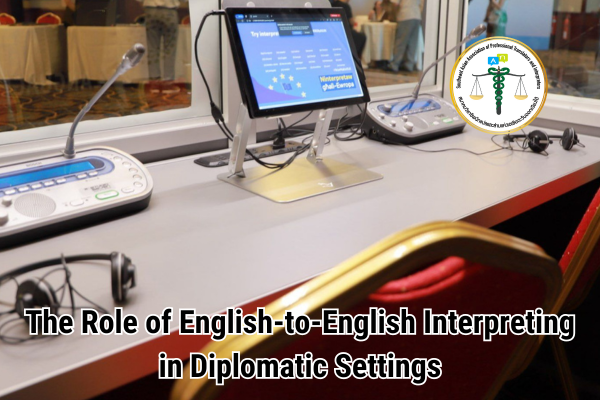

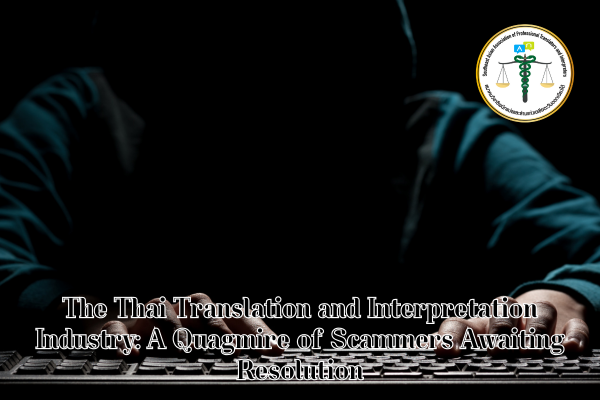





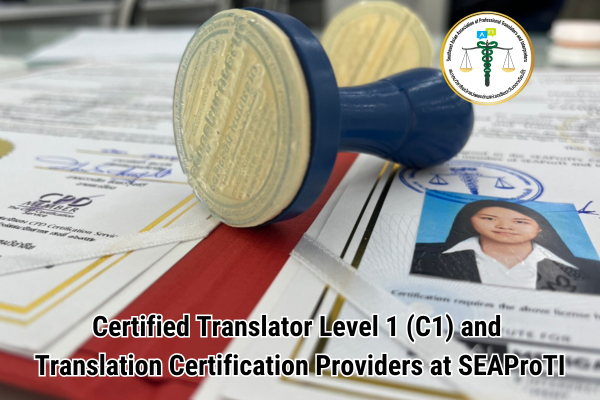
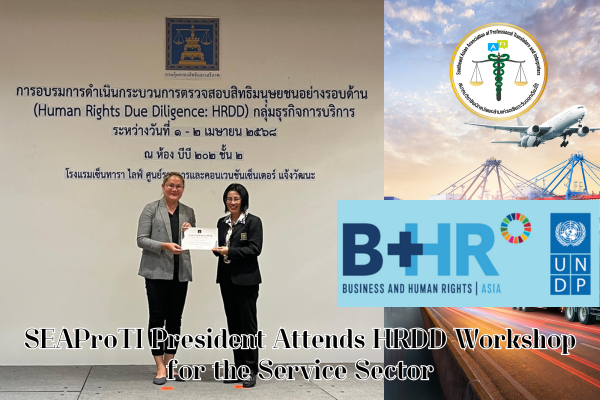

 SEAProTI Expanding Opportunities in ASEAN 31 March 2025, Bangkok – The Southeast Asian Association of Professional Translators and Interpreters (SEAProTI) officially registered as a Service Pr
SEAProTI Expanding Opportunities in ASEAN 31 March 2025, Bangkok – The Southeast Asian Association of Professional Translators and Interpreters (SEAProTI) officially registered as a Service Pr